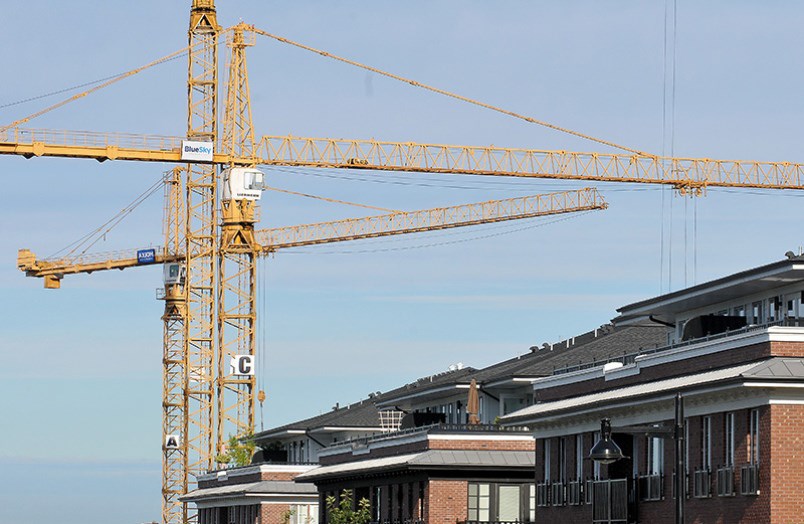A new layer of complexity has been added to the already heated real estate market on the west wide of Coquitlam as owners of older condos in neighbourhoods along the Evergreen Line decide whether to stay or sell.
Some condo owners in older buildings in the high-density transit corridor are trying to get ahead of the market — and potential strata dissolution — as they list their suites individually for top dollar, while others are hiring lawyers and brokers, and going through the windup process, as a complex on Austin Avenue did last year when they sold for $32 million to Anthem Properties.
Whatever the decision, condo owners should do their homework, especially in this uncertain real estate market, said Tony Gioventu, the executive director of the Condominium Home Owners’ Association (CHOA), whose agency provides condo owners with education and support.
“We’ve been doing a number of public forums over the last year for condo owners to understand what the windup process is, if it’s feasible for them," he said. "It all has to do with location, if you have a piece of property in a premium zone or high density area, the value of your property as a collective piece of property is probably worth substantially more than the individual units in an older building that is probably facing long term repairs over the next 10 years. We’ve seen that.”
However he cautions that selling to a developer isn’t a “magic bullet” because property values vary widely from block to block and city to city and there is also the time-consuming process of going to court, if only 80% of your neighbours are willing to sell.
If it takes nine to 10 months to complete the windup, he said, condo prices could quickly outpace settlements, making it difficult to find an affordable place to move in the area.
“People think they are going to live in the same neighbourhood, or even the new building, but they might have to downsize from 1,100 to 500 sq. ft. for the same price,” Gioventu told The Tri-City News.
But one local realtor thinks she might have an answer to this uncertainty by helping sellers list their properties in advance of or during the windup process.
Desi Louvris has listed an apartment on North Road in an area slated for high density in the city's official community plan.
The suite is just 636 sq. ft. in size and the listing price is $650,000 — or more than $1,000 a square foot — which is more typical for a brand new condo.
The building is 41-years old and Louvris said by listing individually, the condo owner has more control over the price.
“There’s also flexibility involved, otherwise the strata council decides for you,” Louvris said.
In other words, the condo owner could potentially walk away with more money than they would if they negotiated with a developer, she said, something to consider given the size of the unit and the price of condos in the Tri-Cities.
“A lot of people are crying because they are losing a lot of money because they can’t buy anything,” Louvris said.
For older buildings, the Strata Property Act determines how sale proceeds are distributed: for strata corporations created before August, 1974, the relative size of the unit is considered in the formula; for strata corporations created between August, 1974 and 2000, the original developer’s estimate of values for strata corporations is used in the formula to determine valuation.
Louvris thinks condo owners have a better chance of getting a bigger payout if they sell on their own.
But a lawyer who represents condos during the wind-up process said it’s buyer beware for those shelling out for units that may or may not eventually be sold to a developer.
“Sometimes people do try to get ahead by putting their units for market ahead of the game if they do think the strata is doing windup,” said Allyson Baker, of Clark Wilson LLP.
However, she said the strata council could decide not to sell or the valuation could be less than the buyer paid, as well there are overhead costs, rules that can prevent rentals and uncertainty.
“You only sell in a windup if you think you are going to make more,” Baker said.
“I am completely neutral. I am there to assure [strata corporations] comply with the act, and ultimately, if we get into court, the court will be satisfied the process was done fairly,” Baker added.
As for CHOA’s Gioventu, he has plenty of advice for strata corporations considering a windup and said his organization will provide assistance on site.
He said condo owners should stick together during negotiations and should be realistic when deciding to sell. Many issues, such as location, need to be considered when deciding whether to wind up.
“Make a prudent decision based on real values not pie in the sky types of hopes and wishes,” he said.
Condo owners should also be choosy and make sure their broker acts exclusively for their strata. He said it is important to hire a lawyer for the windup process, including reviewing the brokerage agreement.
“Unless you are getting 50% more value or facing a massive levy for repairs, you’re going to seriously think about whether or not you’re going to sell,” Gioventu said.
Maintenance is also key and residents should continue to look after their building and protect their asset because windup is not a guarantee of the future.
And for those wishing to buy an older condo and who don’t wish to sell or face windup, Gioventu said to choose an area not close to a transit line or to pick a place that is already built to its maximum density and check the depreciation report to make sure there are no costly renovations required and that there is money in the bank to fix what is needed.
For more information, visit http://www.choa.bc.ca.


